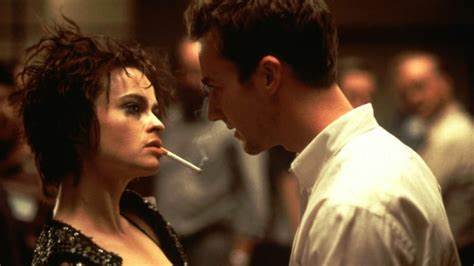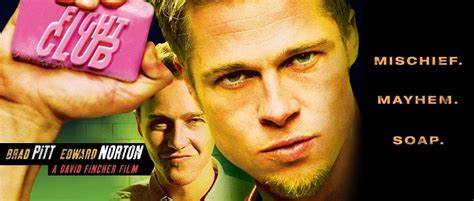
“Fight Club”: A Journey into Modern Masculinity and Consumerism
The film “Fight Club,” directed by David Fincher and based on Chuck Palahniuk’s novel, is an amazing investigation of modern masculinity, consumer society, and existential crisis. The film, which debuted in 1999, gained a cult following and caused debates over its themes, symbolism, and unusual narrative structure.
Plot Summary:
The film centers on an unknown narrator, played by Edward Norton, who fights with insomnia and a humdrum corporate job. Seeking peace, he joins support groups for different diseases, where he meets Marla Singer, played by Helena Bonham Carter. Despite their early hostility, they develop a complex relationship marked by mutual dysfunction.
During a business trip, the narrator meets Tyler Durden, played by Brad Pitt, a seductive soap salesman with an anarchistic philosophical thought. The two men share a distaste for consumer culture and societal standards. Inspired by Tyler’s rebellious energy, the narrator proposes that they join a fight club as a method of primal release. The club becomes popular among dissatisfied males looking for meaning in their life.
As the story unfolds, Tyler’s influence over the narrator grows, leading to increasingly extreme acts of violence and sabotage against symbols of capitalism. The narrator becomes embroiled in Tyler’s underground network, Project Mayhem, which aims to dismantle society and bring about a new world order.
However, the narrator’s grip on reality slips as he learns Tyler is a production of his imagination, a manifestation of his buried emotions and frustrations. In a stunning twist, it is revealed that the narrator and Tyler are two sides of the same person, expressing his internal struggle with identity and purpose.

Themes:
Masculinity and Identity Crisis:
“Fight Club” delves into the modern-day masculinity dilemma, in which traditional roles and expectations have been destroyed by consumerism and cultural change. The narrator’s struggle with recognition highlights this crisis, as he experiences feelings of emasculation and disillusionment.
Tyler Durden represents the narrator’s repressed goals for power, independence, and honesty. The film explores the harmful effects of toxic masculinity and the desire for domination in a hypermasculine society through their relationship.
Consumer Culture and Alienation:
The video examines consumer culture’s impact on personal identity and contentment. The narrator’s soul-crushing profession and luxury lifestyle make him feel hollow and distant from reality. His insomnia represents modern insomnia, in which ceaseless consumption fails to satisfy inner emptiness.
“Fight Club” highlights the seductive allure of consumerism and its role in perpetuating a cycle of dissatisfaction and alienation. The characters seek meaning and purpose through material possessions and superficial experiences, only to find themselves trapped in a hollow existence.
Anarchy and Rebellion:
Tyler Durden embodies the anarchic impulse to rebel against societal norms and authority. He rejects the conformity and complacency of modern life, advocating for a radical form of liberation through chaos and destruction.
Tyler’s ambition for Project Mayhem is to build a new order on the destruction of the old, freeing people from the chains of commerce and societal conditioning. However, the film highlights concerns about the ethics and effects of such anarchic inclinations, implying that unbridled rebellion can result in nihilism and self-destruction.
Dualism and Dissociation:
The duality between the narrator and Tyler Durden is an important topic in the film, which explores themes of dissociation and divided identity. The narrator’s dissociative condition represents his internal struggle between conformity and rebellion, sanity and chaos, and self and other.
“Fight Club” blurs the lines between reality and fantasy, challenging the viewer to question the nature of identity and perception. The revelation of Tyler’s true nature forces the narrator to confront his fractured psyche and reconcile the conflicting aspects of his personality.
Symbolism:
Soap
Soap serves as a recurring motif in the film, symbolizing purity, rebirth, and transformation. Tyler’s homemade soap, crafted from human fat stolen from liposuction clinics, is a grotesque yet potent symbol of rebellion against consumer culture and the commodification of beauty.
Fight Club
The fight club itself is a symbol of primal masculinity and release, providing an outlet for the pent-up aggression and frustration of its members. It represents a rejection of societal norms and a return to a more primal state of being, where physical violence is a means of asserting dominance and reclaiming agency.
Marla Singer:
Marla Singer symbolizes the narrator’s emotional detachment and inability to connect with others. Her presence disrupts his carefully constructed facade of normalcy, forcing him to confront his own vulnerability and humanity.
Corporate America:
Corporate America is depicted as a soulless, oppressive force that exploits and dehumanizes its employees. The narrator’s job in the corporate world symbolizes the soul-crushing monotony and alienation of modern work life, where individuals are reduced to mere cogs in a capitalist machine.
Impact and Legacy:
The duality between the narrator and Tyler Durden is an important topic in the film, which explores themes of dissociation and dispersed identity. The narrator’s dissociative condition represents his internal struggle between conformity and rebellion, sanity and chaos, and self and other.
The film’s iconic quotes, memorable characters, and visual style have permeated the cultural zeitgeist, influencing fashion, music, and art. Its depiction of anarchic rebellion and anti-consumerist sentiment continues to resonate with audiences in an era of growing disillusionment with capitalism and authority.
Controversies
“Fight Club” has courted controversy since its release, with critics accusing it of glorifying violence and promoting toxic masculinity. Some viewers have misinterpreted its message as an endorsement of anarchic ideology, leading to concerns about its potential influence on impressionable audiences.

Conclusion:
“Fight Club” is a thought-provoking look at modern masculinity, consumer society, and existential crisis. The film’s subversive plot and controversial themes urge audiences to consider the nature of identity, revolt, and society conventions. Its enduring legacy and cultural effect continue to captivate audiences, obtaining its place as a cult classic for future generations.
This analysis provides a comprehensive overview of the film’s themes, symbolism, and impact on popular culture, offering insight into its enduring relevance and legacy.